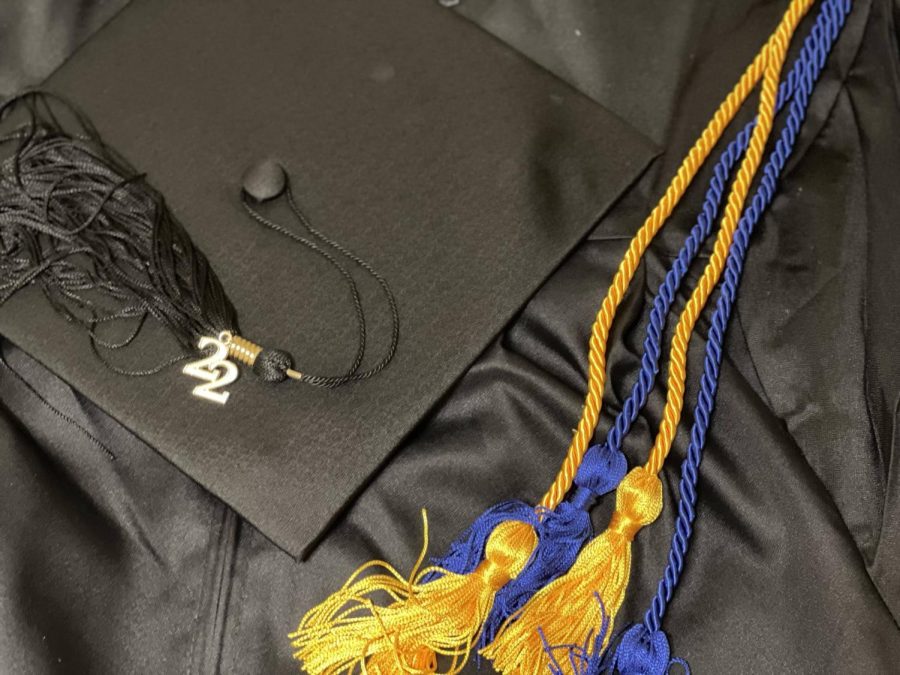The value of the university’s Honors Program
Photo courtesy of Amanda Castro
A graduation cap and gown adorned with honors accolade cords.
The University of New Haven Honors Program allows admission to students with “exceptional academic qualifications.” As a member of the program, undergraduate students are granted access to a number of special privileges and opportunities.
Financially, honors students are granted $1,000 in scholarships annually, with the opportunity to apply for the Hatfield scholar award for $3,000 during their second and third years.
Honors students gain access to a panel of honors-exclusive courses each fall and spring semester, of which, honors students must take at least four to graduate. This comes alongside the privilege of early registration as part of the university’s “special populations,” coming just after senior credential enrollment.
Comparing our 3.3 GPA program requirement to others in the area, Quinnipiac University requires a matching 3.3 throughout students’ time of enrollment; the University of Connecticut requires a 3.0 by the end of freshman year, 3.15 by the end of sophomore year, and 3.3 by the end of junior year. For comparison, the University of New Haven has an 83% acceptance rate while Quinnipiac has a 70% acceptance rate, and UConn has a 49% acceptance rate. For a less competitive school overall, the university actually has a more competitive honors program numerically.
Matthew Wranovix, the head of the program, confirmed the selectivity of the program. He said that the number of incoming first-year students fluctuates, but in the last few years has been averaging between 115 to 120. Compared to the school’s overall population of about 5,000 undergraduate students, only about 3.5% are enrolled as honors students.
Now the true question comes down to the value of our school’s Honors Program. After all, how much of an impact does being an honors student at the University of New Haven have?
For students in competitive majors, with high-demand course requirements, the perk of being part of the second group to register for classes eases some of the tensions of securing seats in certain courses. Fulfilling both requirements and desires every semester is arguably exponentially easier when you are able to register before the standard population dates assigned to juniors, sophomores and freshmen.
The Honors Program also allows for more hands-on experience with research, presentation and grad-school style work with an honors thesis requirement. The university thesis process begins with a class on developing a thesis proposal process in the spring semester of students’ junior year, and ends in their final semester with thesis presentations. Through this process, students work on firsthand exploration on a topic of their interest alongside selected faculty members for a more individualized experience. Honors students also integrate their work into the honors community through their final presentations. This process enhances the undergraduate experience by breaking the monotony of standard in-class learning, as well as providing early experience on thesis work before graduate-level studies.
However, the course offerings at the Honors level are limited, and favor some areas of study over others. These limits force many students to spend credits studying content that does not enhance their degree work or personal aspirations.
This upcoming spring semester, there are courses offered in a select range of subjects; however, they do not take into account the vast majority of students’ disciplines. There are upper-level chemistry and biology courses, just one in each of the areas of arts, economics, finance, history, music and sound recording, management and two health sciences courses.
These courses only accommodate a small selection of the population, and for those in some of the largest areas of study such as criminal justice, psychology, forensics and homeland security, these courses with limited seating may not benefit students in all disciplines. Limited seating and course content forces many students to enroll in classes unrelated to their areas of study in order to fill honors requirements. These credits could otherwise be applied to information relevant to their fields.
In an effort to resolve the lack of diverse representation of course offerings in the university’s Honors program––which seems to be it’s only true shortcoming––the university should consider allowing more professors in different fields of study to offer honors sections of their standard courses, or even special topics courses in the underrepresented areas in the program.

Mia Adduci is a senior studying communication concentrating in multi-platform journalism and media who began writing for the paper her first semester on...




